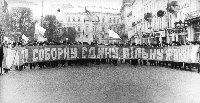An Anniversary and a Warning

The date had been chosen to coincide with the Fourth Universal of the Ukrainian Central Rada, which one year earlier had proclaimed the part of Ukraine which had been under Russian rule sovereign and independent. Both events were central in the Ukrainian struggle for national liberation and both ended in failure.
In reality, the unity of the two states remained only on paper with each side at war with different enemies, UNR with Russia's Bolsheviks and anticommunist Volunteer Army, ZUNR with Poland. Each retained its own government, socialist in Dnipro Ukraine, non-socialist in the West. The West Ukrainians did send troops to aid Dnipro Ukrainian leader Symon Petliura, the most disciplined units to fight under the UNR banner, but in the end, viewing the struggle as hopeless, the Galicians agreed with Denikin's Volunteer Army to cease hostilities, and Petliura agreed with Polish leader Jozef Pilsudski to drop all UNR claims on Western Ukraine. In short, those who had proclaimed their unity with such solemnity ended up deserting each other.
Separated for centuries, the Ukrainians who had been under Austria and
those under imperial Russia were simply very different from each other
in terms of their social structures, levels of development, and outlooks.
Today as well, Ukrainian-speaking and fiercely nationally conscious Western
Ukraine remains very different from the rest of the country, where a large
segment of the population frankly finds it hard to take things Ukrainian
very seriously. The two parts of the country have completely different
political spectrums and keeping them together in one state will always
be difficult. What is popular in one part of the country is anathema in
the other. Thus, in recalling Ukraine's union, we must never allow ourselves
to forget just how precious and fragile a thing it is.
Выпуск газеты №:
№3, (1999)Section
Day After Day





